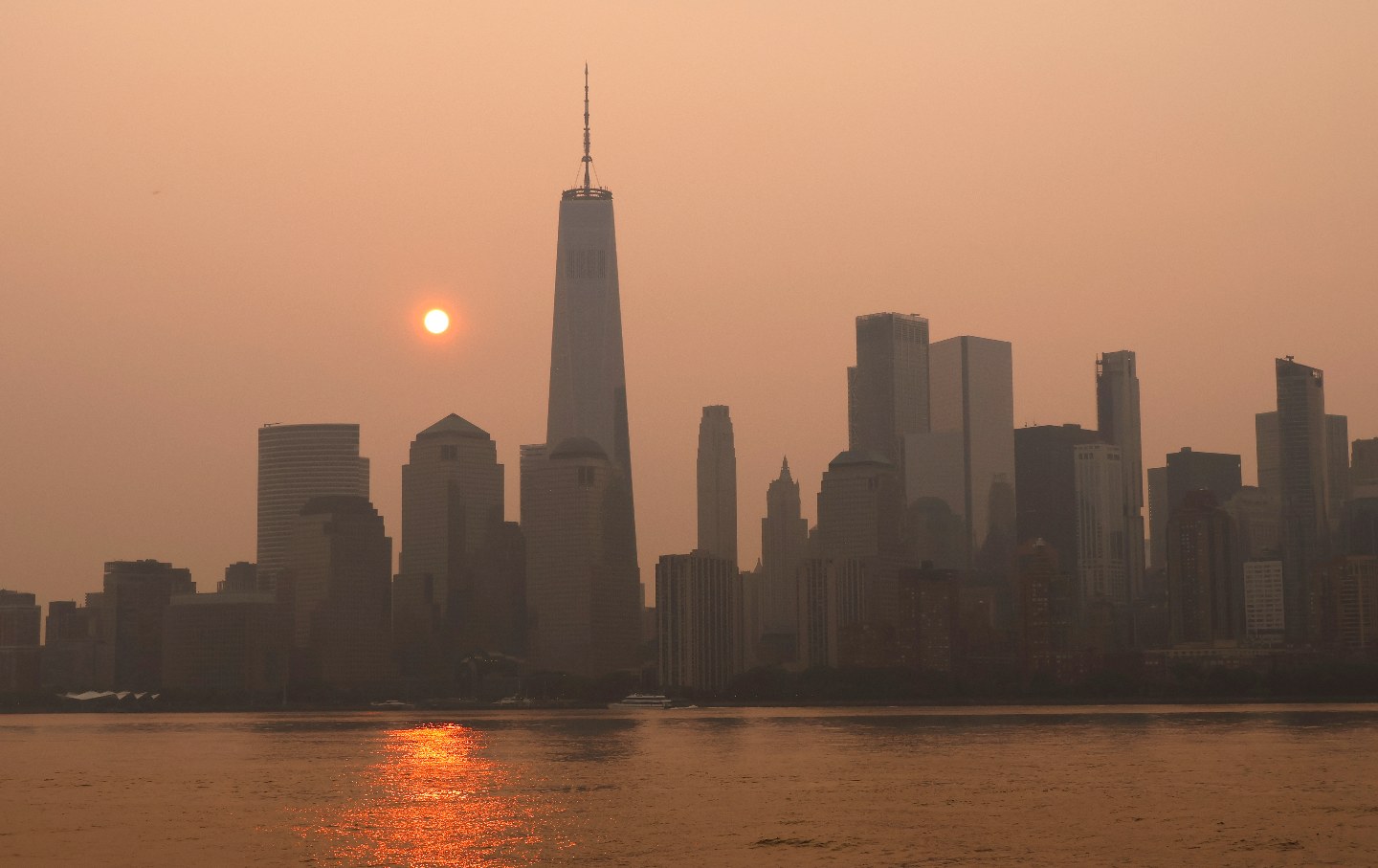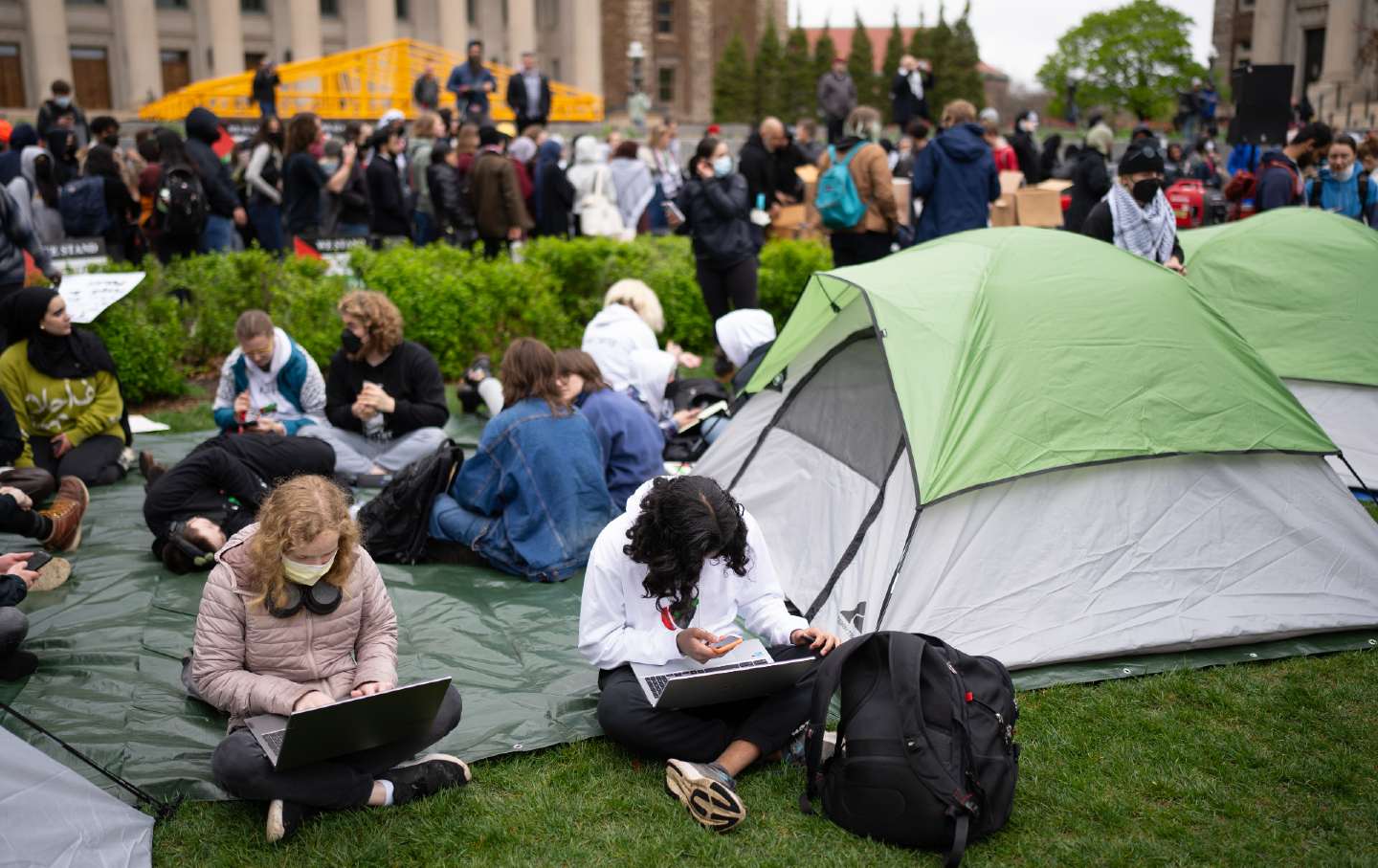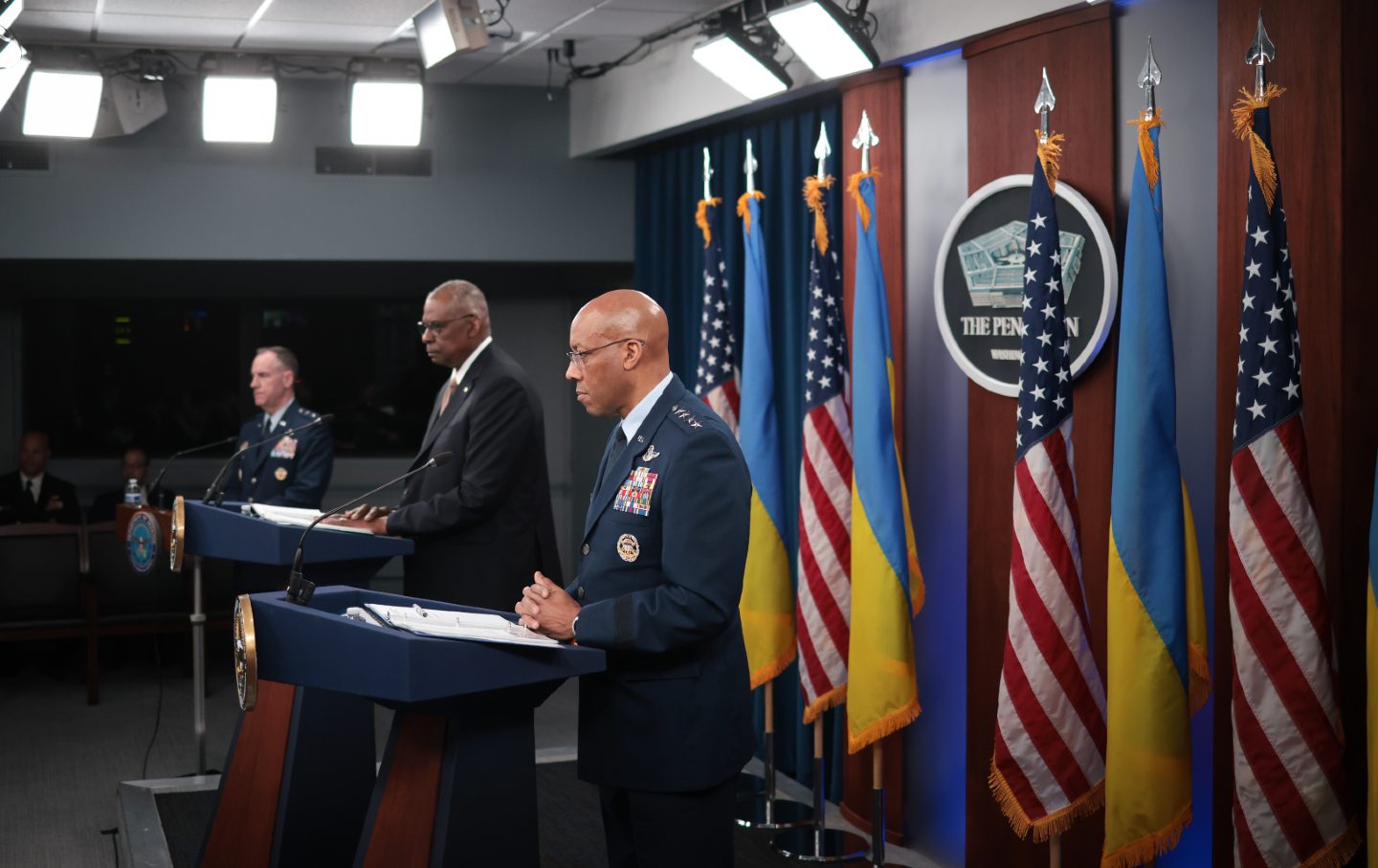The Planet Is Burning
And the US’s habits of primacy are a key reason why.

Smoke shrouding the sun as it rises behind the skyline of Lower Manhattan and One World Trade Center in New York City on June 7, 2023.
(Gary Hershorn / Getty)Yet another COP comes along with another round of bad news on our climate failure. Nobody who seriously follows climate change believes anymore that the world will stay within the 1.5 C “safe” limit of warming. Breaching the even more dangerous 2 C threshold is also getting likelier with every passing year of insufficient action. Current global warming projections are in the 2.5 C—2.9 C range. But we don’t have to run complex climate models to know that wildfires, hurricanes, heatwaves and other signs of an angry planet are already pummeling us, and they will get worse.
The planet is burning. And US habits of primacy are a key reason why.
American primacy is generally defined as its global military dominance—with its enormous firepower, hundreds of overseas military bases, and a sprawling network of allies. The United States also dominates global finance. Matters are more complicated when it comes to trade and investment however, as well as the institutional arena, where newer groupings such as the BRICS (Brazil, Russia, India, China, and South Africa) are revitalizing themselves. This has triggered a debate as to whether we are already in a multipolar world. But Washington’s habits of primacy (as separate from the primacy’s material extent) are more germane to the climate debate. These habits involve a sense of American exceptionalism, an à la carte approach to international law and norms, and an overly moralist gaze toward the rest of the world.
Of course, Washington’s lens of primacy is not the only reason for our inability to resolve the climate crisis. A systemic, wicked problem such as climate change cannot but have multiple causes and implicated actors. The list of climate violators is long, and they span the globe. But the ingrained habits of primacy are a key contributor to our climate failure through three principal axes: the imbalanced US-China dynamic, a dismissive attitude toward the Global South, and a schizophrenic framing of the climate challenge.
First, China. The Sino-US relationship is clearly the single most important bilateral relationship on climate action. If properly structured, the bilateral holds enormous promise on leading the world on the issue. But when Washington does engage Beijing seriously on climate, which happens every time the electoral cycle swings to the Democrats, it pushes to set the agenda, assigning China the role of a responder.
Sometimes Beijing resists strongly, such as on coal. China is notoriously profligate on the polluting fuel, currently adding two coal plants every week to its energy system. At other times Beijing seeks to bridge or even upstage Washington—for example, it’s two major announcements in September 2020 of achieving an emissions peak before 2030 and net zero (i.e., no new net emissions) by 2060. (The United States, given its wealthy country status, has already peaked on its emissions.)
More recently the United States has been urging China to tackle methane emissions. Methane gas is a potent shorter-term warmer. China is the world’s largest methane emitter, but its methane emissions come from hard-to-abate sources, such as agriculture and coal mines. US methane emissions, on the other hand, mostly come from its oil and gas industry and are therefore much easier to cut back.
There are plenty of areas where the United States too is a climate laggard. Federal and state policies have generally encouraged a fossil production boom since around 2010 that has catapulted the country to being the world’s biggest producer and among the top exporters of both oil and gas. Such production , continues to grow and break records. The US also greatly lags China in the transport sector, with less than 10 percent of its auto sales being electric as compared to China’s 40 percent. Both countries are expanding solar and wind electricity, but China is doing it much faster, with such capacity projected to reach an astounding 1 terawatts by the end of this year. US tariffs on Chinese clean energy products and Washington’s aggressive push to expel Chinese battery supply chain manufacturers from the subsidized US market slow down the energy transition by raising costs for all. But Washington shows little willingness to make concessions on these areas in its climate conversation with Beijing.
But shouldn’t China be held more accountable than the United States, considering that it emits three times as much annually? Not quite. For one, China has four times the population of the United States, so in per capita terms, the US is still a significantly higher emitter. Additionally, climate science tells us that global temperature rise is determined by the total GHG stock in the atmosphere, not the rate of emission in any particular year. The math of stocks, rather than annual flows, indicates that the United States is close to twice as responsible as China for the climate damages we experience today.
US climate envoy John Kerry has been careful to not be seen as publicly dictating to Beijing. But a more productive US-China bilateral dynamic would embed joint agenda setting, mutual accountability, and deep technological cooperation for cracking hard-to-abate sectors at the heart of the conversation. If done right, such a reformed structure could catalyze action in both countries in tough areas, rather than just be a one-way pressure pathway, and would also incentivize China to do more.
There is a precedent for elements of such cooperation. Strong and equitable US-China bilateral engagement in the 2012–14 period opened the door to the 2015 Paris Agreement. But treating China on an equal footing consistently, rather than episodically, on climate change does not sit well with the habits of primacy so rife in Washington.
If US-China climate negotiations need reform, Washington’s approach toward the Global South requires a revolution. The 130-odd nations that make up the Global South hold as much as 70 percent of humanity, but have contributed just about a quarter of planetary warming—the same as the United States with just 4 percent of the world’s population. Most glaringly, the entire continent of Africa has contributed only 3 percent.
Popular
“swipe left below to view more authors”Swipe →The core UN principle of “ common but differentiated responsibilities” (CBDR) defines a necessarily differing treatment of the North and the South, reflecting their respective contributions to the problem. Washington typically tries to erase the CBDR principle as much as possible in COP negotiations with Global South states. This enables it to largely escape its responsibilities and put the onus of action on countries with growing emissions profiles in the Global South.
An excellent example of Washington’s unhelpful attitude is the case of the fund for “loss and damage” (also known as “climate reparations”), a focus of bitter battles between the United States and the Global South at recent COPs. Washington sees loss and damage as an entirely optional case of charity—it conveniently rejects the international version of the well-established domestic legal principle of “polluter pays.” The Global South, on the other hand, sees the issue as a historical responsibility.
After opposing the establishment of such a fund for years, the United States finally agreed to set it up at the 2022 COP27 in Egypt. But during further negotiations this year, Washington strongly resisted any language that hinted at greater responsibility for itself. The fund was finally operationalized on the first day of COP28 in Dubai, but Washington was among the tailenders on contributions, with just $17.5 million pledged, while the host nation UAE came in at $100 million.
Washington’s negotiating approach on loss and damage is substantially explained by the habits of primacy. Of course, economic self-interest and domestic politics are also causes of US recalcitrance and the paltry contribution that it eventually made. But blaming congressional Republicans only goes so far. Also, in addition to the UAE, smaller Global North economies such as Germany ($100 million), France and Italy ($109 million each), and the United Kingdom ($50 million) have announced much bigger contributions. Most crucially, Washington ensured that the loss and damage fund will not be initially housed under the more equitable UN auspices as the Global South pushed for but at the World Bank, which the United States dominates.
Finally, the habits of primacy have created a schizophrenic US framing of the climate challenge. At one level, President Biden correctly calls climate change an “ existential threat.” The term frames climate as the gravest of all national security challenges. When it comes to actual US policies however, combating the influence of China and Russia remain by far Washington’s biggest foreign policy priorities.
This contradiction is evident in national security adviser Jake Sullivan’s recent essay in Foreign Affairs, in which he frames today’s era as that of “strategic competition.” The future of the United States, he says, “will be determined by two things: whether it can sustain its core advantages in geopolitical competition and whether it can rally the world to address transnational challenges.”
There are two errors in Sullivan’s otherwise deft essay. For one, he problematically takes strategic competition as a fixed reality that the United States apparently has had no role whatsoever in triggering or sustaining. Going by this logic, Washington can only put guard rails around this competition, not fundamentally ease it. Second, rallying the (presumably entire) “world” to meet an existential common threat is virtually impossible while also embracing intense military and geopolitical competition with near-peers. One of these projects must be subservient to the other.
It is clear which of these two goals need to be prioritized according to the president’s own framing: overcoming the existential climate crisis. However, Sullivan’s essay is dominated by the theme of countering China and Russia—climate action gets far less attention, Moreover, while Sullivan commendably accepts the need to do more to win over the Global South, Washington’s approach at the COPs is not reflective of this. There is a serious disconnect here within the US grand strategy—the initial, laudable impulse of prioritizing climate action has got lost in the sinews of the new cold war.
China and the Global South do not fail to see these contradictions and chart their course accordingly. What the world ends up with is less-for-less—the United States performs suboptimally at home and contributes only modestly to the global transition while raising its global costs, and Global South states and China in turn drag their feet on key benchmarks. The result is a mounting threat to all, including the United States. Twenty years ago, this unhealthy cycle was merely a regrettable reality. At this late climate hour, it has become an emergency.
Thank you for reading The Nation!
We hope you enjoyed the story you just read, just one of the many incisive, deeply-reported articles we publish daily. Now more than ever, we need fearless journalism that shifts the needle on important issues, uncovers malfeasance and corruption, and uplifts voices and perspectives that often go unheard in mainstream media.
Throughout this critical election year and a time of media austerity and renewed campus activism and rising labor organizing, independent journalism that gets to the heart of the matter is more critical than ever before. Donate right now and help us hold the powerful accountable, shine a light on issues that would otherwise be swept under the rug, and build a more just and equitable future.
For nearly 160 years, The Nation has stood for truth, justice, and moral clarity. As a reader-supported publication, we are not beholden to the whims of advertisers or a corporate owner. But it does take financial resources to report on stories that may take weeks or months to properly investigate, thoroughly edit and fact-check articles, and get our stories into the hands of readers.
Donate today and stand with us for a better future. Thank you for being a supporter of independent journalism.
Thank you for your generosity.
More from The Nation

If Joe Biden Really Wants to Celebrate Press Freedom, He Should Free Julian Assange If Joe Biden Really Wants to Celebrate Press Freedom, He Should Free Julian Assange
Joe Biden will celebrate World Press Freedom Day tomorrow. But it is a safe bet that he'll have nothing to say about Assange or Imran Khan, both behind bars for defying the US.

Amazon Says Its Injury Rates Are Down. They’re Still the Highest in the Industry. Amazon Says Its Injury Rates Are Down. They’re Still the Highest in the Industry.
Exclusive: An independent review of Amazon’s annual safety report finds that the company’s warehouse workers experience a disproportionate share of injuries.

MTA Bus Drivers Don’t Work for the Cops MTA Bus Drivers Don’t Work for the Cops
The six bus drivers who walked off the job rather than transport protesters slowed the city’s mass-arrest machine by sticking to their union-negotiated contract.

The Abolitionist Roots of Anti-War Encampments The Abolitionist Roots of Anti-War Encampments
From Minneapolis to Manhattan, the encampments now spreading across college campuses are built on the same principles as abolitionist spaces like George Floyd Square.

The Ukraine Aid Package Heightens the Risk of Escalation The Ukraine Aid Package Heightens the Risk of Escalation
The passage by Congress of the latest aid package to Ukraine was met with cheers, but there is ample reason for caution.



